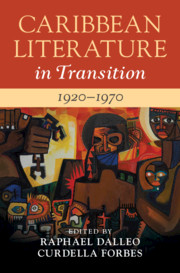Book contents
- Caribbean Literature in Transition, 1920–1970
- Caribbean Literature in Transition
- Caribbean Literature in Transition, 1920–1970
- Copyright page
- Contents
- Figure
- Contributors
- Introduction
- Part I Literary and Generic Transitions
- Chapter 1 Writing at the End of Empire
- Chapter 2 Questioning Modernism
- Chapter 3 Daily Decolonization
- Chapter 4 Towards a National Theatre
- Chapter 5 Orature, Performance, and the Oral–Scribal Interface
- Chapter 6 Explorations of the Self
- Part II Cultural and Political Transitions
- Part III The Caribbean Region in Transition
- Part IV Critical Transitions
- Bibliography
- Index
Chapter 5 - Orature, Performance, and the Oral–Scribal Interface
from Part I - Literary and Generic Transitions
Published online by Cambridge University Press: 16 December 2020
- Caribbean Literature in Transition, 1920–1970
- Caribbean Literature in Transition
- Caribbean Literature in Transition, 1920–1970
- Copyright page
- Contents
- Figure
- Contributors
- Introduction
- Part I Literary and Generic Transitions
- Chapter 1 Writing at the End of Empire
- Chapter 2 Questioning Modernism
- Chapter 3 Daily Decolonization
- Chapter 4 Towards a National Theatre
- Chapter 5 Orature, Performance, and the Oral–Scribal Interface
- Chapter 6 Explorations of the Self
- Part II Cultural and Political Transitions
- Part III The Caribbean Region in Transition
- Part IV Critical Transitions
- Bibliography
- Index
Summary
The parallel and intersecting relationships among the written and oral literatures, folklore, musics, performative arts, and orature of the Anglophone Caribbean have been well documented, giving rise to a large body of critical work in literary and cultural studies by scholars such as Mervyn Morris, Kamau Brathwaite, Gordon Rohlehr, and Funso Ayejina. Sustained treatments such as Carolyn Cooper’s Noises in the Blood: Orality, Gender and the “Vulgar” Body of Jamaican Popular Culture (1993), Kwame Dawes’ Natural Mysticism: Towards a New Reggae Aesthetic in Caribbean Writing (1999), and special issues of academic journals illustrate the growing acknowledgement of these oral–scribal intersections. With a steady growth from the 1920s onward, these cross-genre, cross-media fertilizations reached a high point in the 1970s with the rise and globalization of new forms/expressions of urban music, against the background of major local, regional, and global shifts such as the escalation of nationalist contentions; the Black Power movement; and in Jamaica, the ‘official’ recognition of Rastafari, and the emergence of new dub poetry and other newer genres. The consolidation and recognition of the synergies between orature and literature have in turn fashioned a substantial body of theorizations and scholarly contemplations out of which have emerged terms such as oraliterature, novelylspo, reggae aesthetic, among others.
- Type
- Chapter
- Information
- Caribbean Literature in Transition, 1920–1970 , pp. 82 - 97Publisher: Cambridge University PressPrint publication year: 2021



